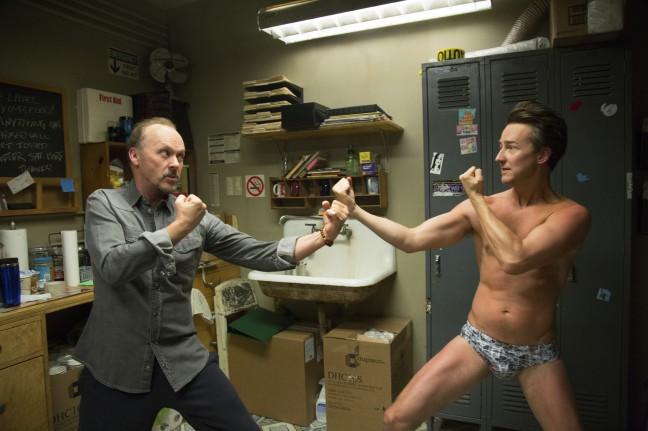Do you remember Michael Keaton? You know, fairly plain-looking, blond, receding hairline? I recall seeing his name on the cover of the family copy of “Beetlejuice,” above the centered image of a man with no distinguished facial characteristics, some gross makeup and a cheap pinstriped suit. And he was in Tim Burton’s version of Batman, which, as far as my generation is concerned, was usurped by that of Christian Bale.
But here he is, alive and weird in the strange drama “Birdman,” written and directed by the amazing Mexican filmmaker Alejandro González Iñárritu, the mastermind behind such films as “Babel” and “21 Grams.”
“Birdman” is about a washed-up actor, Riggan Thomson (played by Keaton, “Need for Speed”), attempting to reenter the spotlight through a Broadway adaptation of Raymond Carter’s story, “What We Talk About When We Talk About Love.” Riggan was previously known for playing the Birdman in a highly lucrative Hollywood franchise in 1992. This is interesting, considering that Michael Keaton played Batman in Burton’s “Batman Returns” in 1992 and we haven’t seen a whole lot of him since. In this way, “Birdman” feels like a dramatized biopic early on.
Riggan is the leading actor, writer and director of the Broadway play, but he is also our director. At the center of the action, calling the shots (literally), fabricating new encounters and new stories, he introduces us to every character, every emotion, every new and unique point of view. He is our narrator, unreliable as he may be, if you consider his Birdman alter ego.
Birdman’s ghostly grumble follows Riggan around for the entirety of the film. Riggan calls these “mental formations” and they remind both us, and him, that he’s fucking worthless.
Early on, Edward Norton (“The Grand Budapest Hotel”) makes his entrance (literally and metaphorically: the amount of “meta” that Iñárritu has buried in “Birdman” will make your head spin) as egomaniacal name-brand actor Mike Shiner, who gives zero shits about anything and is quick to pounce on Riggan’s daughter, Sam, played by Emma Stone (“Magic in the Moonlight”). He is the epitome of the male ego, flaunting his feathers (and by that I mean his dick) across the set. The stage is his only reality.
The film flows through lengthy shots. The action relies on the beats and rattles of a drum set, which is the film’s grounding musical element. With rhythmic twists and turns and one-liners, interlaced between moments of self-doubt and catharsis, this movie truly gives us everything.
But amidst the chaos, the constant turns and quick movements, the film’s best moments are when the camera stops and focuses. When we see Emma Stone’s face closely for the first time, she yells straight at us, “You’re not important. Get used to it.” Stone’s Sam, slightly punked out with torn T-shirts and tattoos and right out of rehab, is our voice of truth – our “you’re not special” reality check. She’s the one putting dashed lines on a roll of toilet paper, with one tiny square representing humanity in the midst of the whole universe.
Sam explains and illustrates the essence of the film: We are nothing but our egos. There it is. That’s the whole movie. Norton’s Shiner and Keaton’s Thomson find themselves whole and real in the short interval of time they spend on a stage, in the limelight. Beyond being watched, “in the real world where it fucking counts,” the two are “fucking fraud[s],” words courtesy of Lesley (Naomi Watts, “St. Vincent”).
There are moments when the film feels long and drawn out. The metaphysical element combined with the philosophical discussion of male ego is sometimes overwhelming. We begin to ask ourselves whether Iñárritu’s film honestly represents the backstage world of an actor, or if the meta is telling us that this commentary on acting is as bullshit and fraudulent as the acting it represents. It is, at times, headache-inducing.
Yet, “Birdman,” with all of its digression, details and snippets of wit and pomp, is completely self-aware. Every line takes on a new meaning in a world where the audience has the last say. Despite what the Birdman alter-ego claims — that Hollywood movies “save people from their boring, miserable lives — when it comes down to it: “Without me (or the audience in this case), all that’s left is you.”


